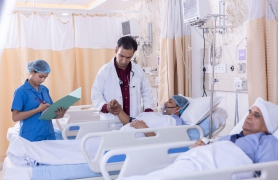
A Bachelor of Science (BSc) in Critical Care Technology is an undergraduate program focused on training individuals for roles in critical care settings. Students learn about patient monitoring technology, respiratory and cardiovascular care, emergency medicine, infection control, and ethical considerations. The curriculum includes theoretical coursework, practical training, and clinical experience. Graduates are prepared to work as critical care technologists, contributing to patient care in intensive care units and emergency departments.
Completion of 10+2 or equivalent with 12 years of schooling from a recognized board or university. Minimum 35% marks in each subject, including English, for all categories.
Year 1: Foundation in Critical Care and Basic Medical Sciences
Year 2: Core Concepts in Critical Care
Year 3: Specialized Areas and Clinical Practicum
Year 4: Internship
Graduates with a B.Sc. in Critical Care Technology have a range of career opportunities in healthcare settings that require specialized care for critically ill patients. Here are some potential career prospects for individuals with this degree:
Critical Care Technologist: Graduates can work as critical care technologists in various critical care units, including intensive care units (ICUs), emergency departments, and cardiac care units. They operate and maintain critical care equipment, monitor patient vital signs, and assist healthcare teams in providing timely interventions.
Respiratory Therapist: With their knowledge of respiratory care, graduates can work as respiratory therapists, specializing in assisting patients with breathing difficulties. They manage mechanical ventilators, administer oxygen therapies, and conduct pulmonary function tests.
Cardiovascular Technician: Graduates can pursue careers as cardiovascular technicians, focusing on monitoring and managing cardiac conditions in critical care settings. They operate electrocardiogram (ECG) machines, cardiac monitors, etc.
Emergency Medical Technician (EMT): With training in emergency medicine, graduates can become EMTs, responding to medical emergencies and providing pre-hospital care. They stabilize patients, administer life-saving interventions, and transfer patients to medical facilities.
Clinical Research Coordinator: Graduates with research skills can work as clinical research coordinators in medical research institutions or pharmaceutical companies. They assist in conducting clinical trials and research studies related to critical care treatments and interventions.
Healthcare Educator: Graduates can become educators, sharing their knowledge by teaching critical care technology courses at vocational schools, community colleges, or specialized training institutes.
Hospital Administration: Graduates can take on administrative roles in hospital settings, managing critical care departments, overseeing equipment procurement and maintenance, and ensuring quality care delivery.
Quality Improvement Specialist: In healthcare institutions, graduates can work as quality improvement specialists, focusing on enhancing patient care and outcomes in critical care units through data analysis and process improvements.
Medical Equipment Sales Representative: Graduates can work in medical equipment sales, representing companies that provide critical care technology and equipment to hospitals and healthcare facilities.
Further Studies: Graduates can pursue higher education, such as a master's degree or specialized certifications, to advance their careers in areas like healthcare administration, advanced critical care practice, or specialized patient care.